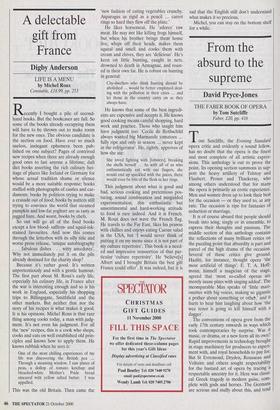A delectable gift from France
Digby Anderson
LIFE IS A MENU by Michel Roux Constable, £15.99, pp. 253 Recently I bought a pile of second- hand books. But the bookcases are full. So some of the books already occupying them will have to be thrown out to make room for the new ones. The obvious candidate is the section on food. Have ever so much useless, inelegant ephemera been pub- lished on one subject? Pages of contrived new recipes when there are already enough good ones to last anyone a lifetime; daft diet books asserting the rich culinary her- itage of places like Ireland or Germany for whose actual tradition shame or silence would be a more suitable response; books stuffed with photographs of castles and car- damons; books by politicos trying to make a crusade out of food; books by nutters still trying to convince the world that steamed pumpkin and low-fat yoghurt are as tasty as jugged hare. And worst, books by chefs.
So out will go all of the food books except a few blood- saffron- and squid-ink- stained favourites. And now this comes through the letterbox with its silly title and worse press release, 'unique autobiography . . . fabulous dishes . . . witty anecdotes'. Why not immediately put it on the pile already destined for the charity shop?
Because it's rather good. It's written unpretentiously and with a gentle humour. The first part about M. Roux's early life, especially his culinary life, in France after the war is interesting enough and so is his work in England, especially his shopping trips to Billingsgate, Smithfield and the other markets. But neither that nor the story of his recipes is what makes it good. It is his opinions. Michel Roux is that rare thing among cooks today, a man with judg- ment. It's not even his judgment. For all the 'new' recipes, this is a cook who shops, cooks and eats on well established old prin- ciples and knows how to apply them. He knows rubbish when he sees it: One of the most chilling experiences of my life was , discovering the British pea ... Through a steaming window, I saw plates of peas, a dollop of tomato ketchup and bleached-white Mother's Pride bread smeared with yellow salted butter. I was appalled.
This was the old Britain. Then came the `new fashion of eating vegetables crunchy. Asparagus as rigid as a pencil ... carrot rings so hard they flew off the plate.'
He likes horsemeat. He 'adores' raw meat. He may not like killing frogs himself, but when his brother brings them home live, whips off their heads, makes them squeal and smell and cooks them with cream and chives, they are 'delicious'. He's keen on little bunting, caught in nets, drowned to death in Armagnac, and roast- ed in their own fat. He is robust on hunting in general:
City-dwellers who think hunting should be abolished would be better employed deal- ing with the pollution in their cities ... and let those in the country carry on as they always have.
He knows that some of the best ingredi- ents are expensive and accepts it. He knows good cooking means careful shopping, hard work and practice. Those who taught him have judgment too: 'Cecile de Rothschild always wanted big Marmande tomatoes ... fully ripe and only in season ... never kept in the refrigerator'. He, rightly, approves of how she ate:
She loved fighting with [lobsters], breaking the shells herself ... As with all of us who enthusiastically eat with our fingers, she would end up speckled with the juices, there would even be bits of the flesh in her rings.
This judgment about what is good and bad, serious cooking and pretentious pos- turing, sound combination and misguided experimentation, this enthusiastic but unsentimental and hard-working attitude to food is rare indeed. And it is French. M. Roux does not wave the French flag. He travels to the Far East, likes his prawns with chillies and enjoys eating Caesar salad in the USA, but would never think of putting it on my menu since it is not part of my culture repertoire'. This book is a need- ed and impressive reassertion of that par- ticular 'culture repertoire'. He `believe[s] Albert and I brought Britain the best gift France could offer'. It was indeed, but it is sad that the English still don't understand what makes it so precious.
Michel, you can stay on the bottom shelf for a while.

























































































 Previous page
Previous page